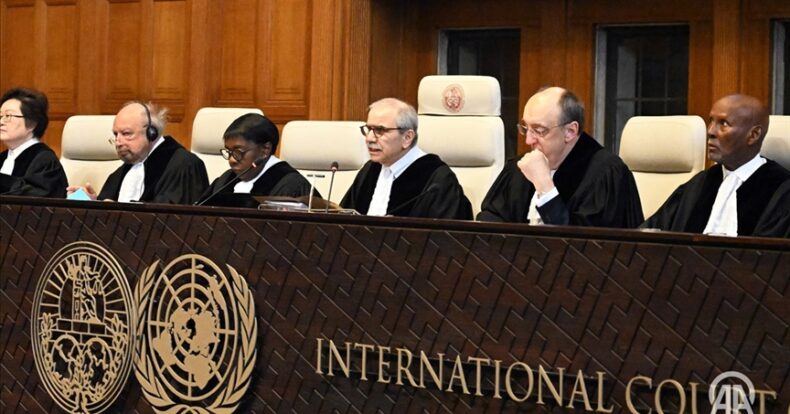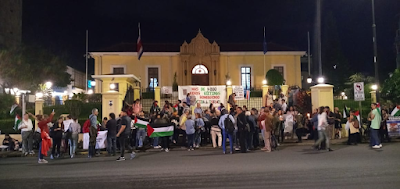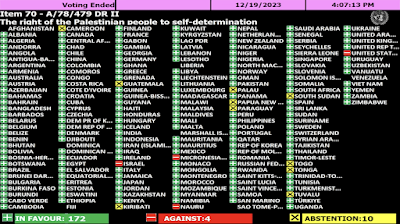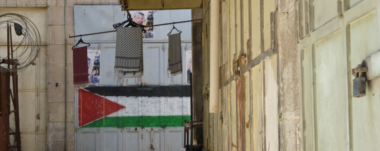Gaza/Israel: ICC reiterates urgency of arrest warrants

ICC reaffirms urgency of issuing arrest warrants in Gaza/Israel conflict for possible war crimes in the region. Original title: “Gaza / Israel: Prosecutor of the International Criminal Court (ICC) reaffirms urgency of arrest warrants”. Text written by Professor Nicolás Boeglin, from the Faculty of Law of the University of Costa Rica..
In a document sent on August 23 to the Pre-Trial Chamber of the International Criminal Court (ICC), the ICC Prosecutor has reiterated his request for arrest warrants against Israeli leaders (its Prime Minister and Defense Minister) and against three Hamas leaders.
This legal opinion also allows the ICC Prosecutor to respond to some of the submissions sent to the ICC by States, international organizations, NGOs and academics, including some (very few as far as States are concerned) that questioned his actions from a legal point of view, based on fanciful legal interpretations.
According to the ICC was established in 1998 with the adoption of the Rome Statute, an international instrument that has 124 States Parties (see official status of signatures and ratifications). In Latin America, the last State to have ratified it was Guatemala in 2012, while Cuba and Nicaragua persist in not even having signed this instrument.
Since August 23rd, a brief search on the web shows that the content of the ICC Prosecutor’s document has received very little coverage in the major international media.
The Unspeakable Gaza Drama
The latest situation report on Gaza, prepared by the United Nations as of August 30, 2024, is recommended reading (see link).
The penultimate report (as of August 26, 2024, see link) reads that Israel’s relentless bombardment of Gaza’s civilian population has not been interrupted, with new dramas experienced in Gaza in recent days on an ongoing basis:
Between the afternoons of 23 and 26 August, according to the Ministry of Health (MoH) in Gaza, 170 Palestinians were killed and 390 were injured. Between 7 October 2023 and 26 August 2024, at least 40,435 Palestinians were killed and 93,534 were injured, according to MoH in Gaza.
The following are some of the deadly incidents reported between 22 and 25 August:
On 22 August, five Palestinians were reportedly killed and others injured when a house was hit in the vicinity of Bani Suheila square, east of Khan Younis.
On 23 August, five Palestinians were reportedly killed when a vehicle was hit southeast of Khan Younis.
On 23 August, four Palestinians were reportedly killed and others injured when a house was hit in northwestern An Nuseirat Refugee Camp, Deir al Balah.
On 24 August, four Palestinians were reportedly killed and others injured when a house was hit in Maan area, east of Khan Younis.
On 24 August, 11 Palestinians, including women and children, were reportedly killed and 30 others injured when a house was hit in Al Amal neighborhood, west of Khan Younis.
On 24 August, at about 12:10, eight Palestinian men were reportedly killed when a vehicle (tuk-tuk) was hit in northwestern Rafah.
On 25 August, eight Palestinians were reportedly killed and others injured when a house was hit south of Deir al Balah.
According to some specialists, the death toll of more than 40,000 people in Gaza is far below the reality of the situation. A recent article published by a renowned military specialist invited to numerous news programs in France, entitled “Guerres en Ukraine et en Israël, (enfin) des voies de sortie en perspective?”, states that the real figure could correspond to some 100,000 people killed in Gaza since October 7, 2023:
les évaluations des dégâts des bombardements montrent – même en hypothèse basse – que le bilan projeté se situe plutôt autour de 100,000 morts et donc de 350,000 blessés (le ratio de 3,5 est la « norme »), soit 20% de la population palestinienne de Gaza « au bas mot » (450,000 / population initiale de 2,3 millions), blessée ou tuée par cette guerre démesurée.
The absence of verifiable data is largely due to the absence of humanitarian agency personnel deployed throughout Gaza, and the absence of media outlets that can document and inform international public opinion about the reality in Gaza and the exact extent of Israel’s aerial bombardment of Gaza’s civilian population. In this regard, the deliberate killing by Israel of journalists, cameramen, media assistants led some 60 organizations that ensure the protection of journalists to raise the tone and demand that the European Union (EU) take action (see collective letter dated August 22, 2024). The letter states that:
Journalists play an indispensable role in documenting and reporting on war crimes and other human rights violations. The cumulative effect of these abuses is to create the conditions for an information void, as well as for propaganda and mis- and disinformation. While Israel contends that its actions are to keep its people safe, history shows that censorship and denial of the right to information is a flawed path to peace or security. We, therefore, write to you today to call for the suspension of the Israel / EU Association Agreement on the basis that it has violated international human rights and criminal law and for the adoption of targeted sanctions against IDF officials and others responsable.
As of August 23, 2024, according to the Committee to Protect Journalists (CPJ), the number of journalists killed in Gaza by Israeli military forces since October 7, 2023, stands at 116 media professionals (see report).
As for UN humanitarian personnel in Gaza, the death of 280 UN staff in Gaza since October 7, 2023 (see communiqué) was commemorated on International Humanitarian Day last August 19 (see communiqué): a toll never reached in any theater of operations in which UN personnel have been present.
Related to the exactions committed in Gaza, on August 26, the NGO Human Rights Watch published a detailed report on the torture to which people working in hospitals in Gaza, captured by Israel, were subjected (seereport).
Israel’s erratic military strategy in Gaza from a military standpoint
We recently had the opportunity to detail these and some other aspects of the unspeakable drama in Gaza, as well as to analyze the failed military strategy in Gaza in a broadcast of Radio UCR’s Desayunos program (see link to the August 21, 2024 broadcast, titled “What’s Happening in Gaza?”).

While attention has been focused on the situation in Gaza, the latest UN report on the situation in the West Bank (see report as of August 28, 2024) reveals the climate of impunity for exactions of all kinds committed by settlers against Palestinian families and their property, in the face of the passivity of Israeli security forces, with a toll of 622 people killed since October 7, 2023 in the West Bank and East Jerusalem.
Note that this September 1, 2024, there has been a reported call for a general strike in Israel launched by various quarters in the face of the resounding and utter failure of its Prime Minister’s strategy in Gaza to recover the hostages captured by Hamas on October 7, 2023 (see note from the Times of Israel and note from AgenciaNova of September 1, 2024): this is an initiative fostered in large part by the indignation of the families of hostages (as well as the political opposition) witnessing the repeated blunders of Israel’s military apparatus in recovering their loved ones and the torpedoing of negotiations with Hamas by the Israeli Prime Minister.
Significantly, as July 2024 began, polls in Israel indicated that more than half of the population was convinced that the deadly military operation in Gaza was purely a political calculation by their Prime Minister (see note in The Times of Israel of July 4). A few weeks later, distrust of the Prime Minister continued to be evident, with a majority wanting to see him removed from office (see note from the Times of Israel of July 12).
Inside the Israeli war cabinet itself, the Prime Minister’s position is increasingly questioned by its other members in the face of his failed strategy to recover the hostages that Hamas is holding somewhere in Gaza in its custody (see note from the TimesofIsrael of September 1, 2024).
International criminal justice: the challenge for Israel and its allies
Beyond the peculiar political survival strategy of the Israeli Prime Minister deployed after the events of October 7 (whose responsibility is undeniable, having shelved previous warnings received about Hamas’ intentions), it should be recalled that some diplomatic infidels have in the past highlighted the great challenge posed to Israel by the existence of the ICC in The Hague.
In November 2012, when the United Nations General Assembly granted the status of “Non-Member Observer State” to Palestine (in a vote in which only 9 States voted against, namely: Canada, United States, Marshall Islands, Israel, Nauru, Palau, Panama and Czech Republic), the United Kingdom chose to abstain.
But the UK had announced that it would vote in favor, but only if Palestine gave it assurances that it would not go to the ICC:
The U.K. suggested that it might vote “yes” if the Palestinian Authority offered assurances that it wouldn’t pursue charges in the International Criminal Court, but apparently came away unsatisfied.
véase nota de prensa de noviembre del 2012 de The Washington Post, un medio cuyos corresponsales son usualmente bien informados.
This deep concern regarding international criminal justice recalls another diplomatic infidelity prior to 2012, and released this time by the Wikileaks portal: regarding the deadly Israeli military offensive in Gaza in 2009 (Note 1), it was read that, during a conversation with American diplomats (see cable dated February 23, 2010 from the U.S. Embassy in Tel Aviv), the following confidence was exuded by Colonel Liron Libman in 2010:
Libman noted that the ICC was the most dangerous issue for Israel and wondered whether the U.S. could simply state publicly its position that the ICC has no jurisdiction over Israel regarding the Gaza operation.
Colonel Liron Libman, a high-ranking Israeli official, was (and probably still is in this month of September 2024) a great connoisseur of the rules of international law: he served for many years as Head of the International Law Department of the Israeli Defense Forces (IDF).
Prosecutor’s conclusions forthcoming
An extensive 49-page document (see full text), the ICC Prosecutor rejects several views sent by some States and entities to the ICC on some alleged limitations that would derive for the ICC from the Oslo agreements, and concludes that:
113. In addition to being manifestly out of time, Israel’s letter neither mentions article 18 nor satisfies the legal requirements of a deferral request under article 18. Merely asserting the capacity of the Israeli justice system and that some investigations are ongoing is not sufficient. The requesting State bears the burden of proof and must demonstrate that its proceedings sufficiently mirror the scope of the Prosecution’s intended investigation. It must provide information of a sufficient degree of specificity and probative value to demonstrate an advancing process of relevant domestic investigations or prosecutions, including patterns of criminality and high-ranking officials. Israel did not provide any such material that would meet this burden. Nor, as outlined above, does any such information appear to exist.
IV. RELIEF REQUESTED
114. The Prosecution respectfully requests the Pre-Trial Chamber to:
– dismiss in limine the observations unrelated to the Oslo Accords; and
– urgently render its decisions under article 58, on the basis of the Prosecution’s Applications, these submissions, and the Article 19(3) Decision.
The opening part of his opinion states that for the ICC Prosecutor, the arguments according to which Israel has proceeded to investigate the exactions of its military forces in Gaza are unacceptable:
8. (…) As the Prosecution has concluded, and as is evident from the public record, there are no domestic proceedings at present which deal with substantially the same conduct and the same persons as the cases presented to the Chamber pursuant to article 58 of the Statute. There is no information indicating that Benjamin NETANYAHU or Yoav GALLANT, Israel’s Prime Minister and Minister of Defence, respectively, are being criminally investigated or prosecuted, and indeed the core allegations against them have simply been rejected by Israeli authorities.
Further in part of his brief, it is stated that for the ICC Prosecutor:
93. In any case, and additionally, the available information does not show that Israel is investigating substantially the same conduct as the ICC. For instance, the information available does not suggest that the above inquiries relate to the conduct underlying the war crime of starvation and/or related crimes. Likewise, the available information does not suggest any inquiry into patterns of criminality, or the potential responsibility of high-ranking officials, which may among other considerations signify the investigation of contextual elements of crimes against humanity. Indeed, significantly, on 28 May 2024 the MAG categorically rejected the commission of these crimes without any indication or implication that such conclusions resulted from a full and rigorous investigation, or indeed any investigation at all.
Brief procedural context
As such, the deadline granted by the ICC Pre-Trial Chamber for the receipt of legal opinions has come to an end, and the Pre-Trial Chamber must now make a final decision on the request for arrest that it received on May 20, 2024 from the ICC Prosecutor himself.
In June 2024, this additional period of time is due to an initial delaying maneuver by the United Kingdom, which opened a waiting period for ICC judges to receive various legal opinions submitted by States, international organizations, NGOs and academics. Due to the outcome of the UK elections on July 4, 2024, the new UK authorities considered it unnecessary to continue the process and did not submit any legal opinions to the ICC on behalf of the UK.
With regard to Latin America, we had had the opportunity to refer to the legal opinions sent by Latin American States to the ICC in a previous note edited on August 6, 2024, and entitled “Latin America in the face of the drama in Gaza: regarding the observations sent by Bolivia, Brazil, Chile, Colombia and Mexico to the International Criminal Court (ICC)”.
If some of our esteemed readers do not find their country of origin listed, it is very valid to ask why such omission and inaction on the part of their national authorities may be due to such omission and inaction. We leave aside the particular case of our Argentine readers, as will be explained below.
In the specific case of Ecuador, the recent agreement with Israel (April 2024) denotes a rapprochement – quite unusual – of a Latin American State with the current authorities of Israel (see official communiqué of Ecuador and note press release of El Telégrafo, April 2024).
Over the past year, a recent official announcement on the idea of relocating its embassy from Tel Aviv to Jerusalem is evidence of the close relationship of its current authorities with those of Israel (see note from MercoPress July 2024). In May 2024, there was a considerable increase in Paraguayan meat exports to Israel (see note from ValorAgro). It is timely to recall that in May 2018, Paraguay announced to move its Embassy to Jerusalem (see official communiqué of May 9, 2018), a decision reversed a few months later by the newly elected Guarani authorities (Note 2).
Noting that the communication submitted by Colombia to the ICC was accompanied by those of Spain (see document), Ireland (see document), as well as Norway (see full document) and by a joint legal opinion submitted by Chile and Mexico (see text). These documents point in the same direction as the one submitted by Palestine (see document): international criminal justice is legally fully empowered to be applied in the occupied Palestinian territory, without limitation of any kind, and it is high time that it materializes through the issuance of the arrest warrants requested.
As an interesting fact, overlooked in the few press articles and commentaries signed by analysts, editorialists and specialists, Israel chose not to submit any written opinion to the ICC.
The legal opinion forwarded to the ICC by the 30 UN human rights experts who sent a joint opinion to the ICC judges (see document, whose full reading and re-reading are recommended), and who conclude by emphatically pointing out that:
23. The Mandate Holders recognize the Court’s role in ensuring international justice as a critical component of preserving international order through the protection of the interests of victims of international crimes. People around the world, especially youth, advocating for the application of international law, are watching closely, hoping the promises of international peace are not devoid of meaning.
24. In light of the expert opinions shared in this document, the Mandate Holders urge the Court not to further delay the delivery of justice in the occupied Palestinian territory, through the prosecution of alleged criminals. The significant effects of this failure would be felt far beyond the tormented land of Palestine.
Even though the proceedings initiated by the UK authorities in June 2024 have not been pursued, the dilatory nature of the British maneuver explains that since the request for arrest warrants dated May 20 by the Prosecutor, the ICC is still analyzing the request.
The timeframe can be compared to the arrest warrant against two senior officials in Russia (including its President) issued by an ICC Pre-Trial Chamber on March 17, 2023 (see official communiqué of the ICC), preceded by a request from the Prosecutor dated February 22, 2023.
The particular case of the United States
Alleging an alleged limitation to the jurisdiction of the ICC, Israel has been able to rely on an official document submitted by the United States (see document). The peculiarity is that this document comes from a State that is not a State Party to the 1998 Rome Statute establishing the ICC.
A document attempting to restrict the international criminal jurisdiction in Gaza of the ICC was also submitted by the following European States, which are States Parties to the Rome Statute: Germany (see document), Hungary (see document) as well as the Czech Republic (see document).
This time, no opinion favorable to Israel was submitted to the ICC judges by states that are usually very solicitous when it comes to Israel and international criminal justice: Australia, Austria, Canada, Guatemala, Uganda and the United Kingdom, as well as some of the Pacific islands (Marshall Islands, Micronesia, Nauru, Palau and Papua New Guinea). This is a small group of states that usually appears voting with Israel and the United States at the United Nations and also did not appear in December 2023 when a resolution was voted on at the United Nations General Assembly on the right to self-determination of the Palestinian people: see resolution A/Res/78/192), which registered 172 votes in favor, 10 abstentions and only 4 votes against (United States, Israel, Micronesia and Nauru).

Paragraphs 16-26 of the brief submitted by the United States (see document) constitute an attempt – rather crude – to discredit the ICC Prosecutor’s application based on an interpretation of the provisions of the Rome Statute to which the United States… is not a State Party.
A non-State Party to a landmark international instrument such as the Rome Statute… explaining how its provisions are to be interpreted to ICC judges? How so? As it reads.
Argentina’s profound loneliness
On the Latin American side, as a notorious gesture in support of the legal theses favorable to Israel on an alleged limitation to the ICC’s jurisdiction derived from the 1993 Oslo agreements, we find the only brief submitted by Argentina (see document): As a detail of some interest, the document is signed by the head of the Argentine diplomacy, unlike the other briefs submitted by States to the ICC, which are signed either by a junior diplomatic official of relative relevance (Germany, United States, Hungary, Ireland, Norway, Czech Republic), by the Chargé d’Affaires on duty at the diplomatic legation in The Hague (Colombia, Brazil) or by the diplomatic representative in The Hague: this is the case of Bolivia, Spain, as well as the document jointly signed by Chile and Mexico (see text).
In the case of the Republic of Congo, the text is also signed by a minister: the Minister of Justice.
It would be interesting to know the exact reasons why the Argentine and Congolese diplomacy chose to send a document of this nature signed in the handwriting of an official of ministerial rank.
Concerning Argentina’s “support” in favor of legal theses favorable to Israel this August 2024 (see document), it is noteworthy that, in the framework of a similar exercise, it was Brazil in 2020 that explained that the ICC could not exercise its jurisdiction in relation to exactions committed by Israel in the Occupied Palestinian Territory (see document subscribed by a junior official): a ‘coincidence’ between Bolsonaro’s Brazil and Milei’s current Argentina that deserves to be highlighted.
Recently in Brazil, the existence of an electronic “cloud” hosted in Israel with the personal data of more than 30,000 Brazilians was discovered (see nota press release from Página12 January 2024): apparently, the Pegasus program and other software that Israel has gifted to Arab states that agreed to normalize relations under the so-called “Agreements of Abraham” of 2020 (and which allow spying on and monitoring conversations of political opponents) – see note from the 2023 MERP – was also gifted to President Jair Bolsonaro’s Brazil. From a human rights perspective, this report by the NGO Amnesty International analyzes the risk posed, for political opponents, trade unionists, critical journalists and activists in general or social organizations, by the Pegasus program. In 2022, the same American NGO Human Rights Watch denounced that its staff was subjected to surveillance using this Israeli software (see note).
Returning to the ICC, on that occasion (2020), Brazil’s legal argument, as well as that of Germany, Austria, Hungary, Czech Republic and Uganda was rejected by the Pre-Trial Chamber in a landmark decision of February 5, 2021, which we had the opportunity to analyze at the time (Note 3).
Since August 2024, Argentina is the only Latin American State to have submitted to the ICC a brief in an attempt to favor Israel before the ICC judges.
Needless to say, when the United Nations General Assembly voted on a resolution in May 2024 on the rights of Palestine as a future Member State of the United Nations, Argentina once again “stood out” in Latin America by being the only State in the region to vote against it, along with 8 other States: the United States, Hungary, Israel, Micronesia, Nauru, Palau, Papua New Guinea and the Czech Republic (see our note entitled ‘Palestine: on the recent resolution on the rights of Palestine as a future Member State of the United Nations’ published on May 10, 2024).
Back in June 2024, Argentina’s head of diplomacy reported that “progress” was being made to proceed with the relocation of Argentina’s embassy in Israel from Tel Aviv to Jerusalem (see note of June 24, 2024 from LaPolíticaOnLine).
ICC and Israel: extreme vigilance
Note that in May 2024 a group of journalists in Israel unveiled a specific Israeli intelligence eavesdropping and interception program dedicated solely to ICC personnel and the contents of their computers: the article entitled ‘Surveillance and interference: Israel covert war on the ICC exposed’ published by Magazine+972 media on May 28, 2024 constitutes a highly recommended reading report, in which one can learn how for almost 10 years Israel has been constantly surveilling the ICC and its staff.
Among other details, it reads that:
The former prosecutor was far from the only target. Dozens of other international officials related to the probe were similarly surveilled. One of the sources said there was a large whiteboard with the names of around 60 people who were under surveillance — half of them Palestinians and half from other countries, including UN officials and ICC personnel in The Hague.
According to the report, for each case brought to the attention of the ICC “intercepted“, Israel prepared detailed information in order to assert its own internal investigations carried out, in order to be able to invoke the principle of complementarity before the Prosecutor and the judges of the ICC:
If materials were transferred to the ICC, it had to be understood exactly what they were, to ensure that the IDF investigated them independently and sufficiently so that they could claim complementarity,” one of the sources explained. “The claim of complementarity was very, very significant“.
Faced with general reprobation and lack of transparency from the same authorities in the Netherlands (see note from The Guardian of May 31, 2024 reporting a lawmaker’s initiative), finally, the authorities in the Netherlands summoned Israel’s representatives in the Dutch capital to seek clarification and express their deep indignation at such an action (see note from The Guardian, June 24, 2024): this Israeli eavesdropping and interception program violates the most elementary rules protecting international organizations and their officials in force in the international legal order.
In conclusion
Despite the seriousness of the revelations made from Israel by extremely well-informed Israeli journalists who also made known the existence of the “Lavender” artificial intelligence program used in Gaza since October 7 (Note 4), the time taken by the Netherlands authorities to proceed to summon Israel’s diplomats evidences some kind of resistance within its state apparatus.
Now that the deadline for receipt of legal opinions has expired, the three judges of the ICC Pre-Trial Chamber are expected to announce in the coming weeks their final decision on the request made on May 20 by the ICC Prosecutor concerning two senior Israeli officials (its Prime Minister and Defense Minister) and three Hamas leaders (one of whom was assassinated in Tehran by Israel on July 31).
Note that this August 31, the Prime Minister of Senegal did not hesitate to state publicly that:
Nous avons un Premier ministre (israélien) dont le pouvoir dépend de cette guerre, (dont) la survie politique dépend de cette guerre, et qui est prêt à marcher sur des milliers de cadavres pour rester Premier ministre et pour ne pas faire face à la justice de son pays.
see note from the French media 20minutes of August 31.
Text shared by Nicolás Boeglin, Professor of Public International Law, School of Law, University of Costa Rica (UCR). Contact: [email protected]
Notes
Note 1: Israel’s military offensive in Gaza conducted between December 28, 2008 and January 17, 2009 (see report.
Note 2: On the decision to move the embassy from Tel Aviv to Jerusalem by President Cartes in Paraguay in May 2018, and then the decision by new President Mario Abdo Benitez to return it to Tel Aviv a few months later, see our note: BOEGLIN N., ‘Paraguay’s courageous decision to reestablish its Embassy in Tel Aviv: a brief put into perspective’, edited September 11, 2018.
Note 3: See our note BOEGLIN N., “International Criminal Court (ICC)/Palestine: the end of impunity for perpetrators of war crimes committed in Palestine?”, edited February 5, 2021.
Note 4: This same group of Israeli investigative journalists made known to the world the existence of the artificial intelligence program “Lavender” by which Israel proceeds to choose the people it eliminates in Gaza: see link.





